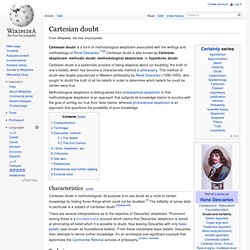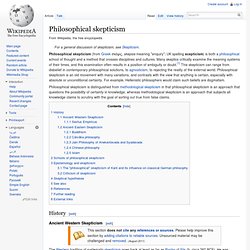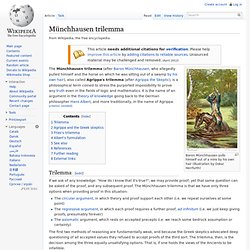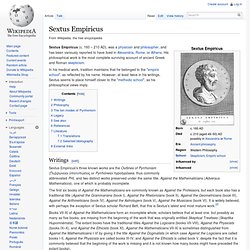

Cartesian doubt. Cartesian doubt is a form of methodological skepticism associated with the writings and methodology of René Descartes.[1][2] Cartesian doubt is also known as Cartesian skepticism, methodic doubt, methodological skepticism, or hyperbolic doubt.

Cartesian doubt is a systematic process of being skeptical about (or doubting) the truth of one's beliefs, which has become a characteristic method in philosophy. This method of doubt was largely popularized in Western philosophy by René Descartes (1596-1650), who sought to doubt the truth of all his beliefs in order to determine which beliefs he could be certain were true. Methodological skepticism is distinguished from philosophical skepticism in that methodological skepticism is an approach that subjects all knowledge claims to scrutiny with the goal of sorting out true from false claims, whereas philosophical skepticism is an approach that questions the possibility of pure knowledge. Characteristics[edit] Cartesian doubt is methodological.
Philosophical skepticism. For a general discussion of skepticism, see Skepticism.

Philosophical skepticism (from Greek σκέψις, skepsis meaning "enquiry"; UK spelling scepticism) is both a philosophical school of thought and a method that crosses disciplines and cultures. Many skeptics critically examine the meaning systems of their times, and this examination often results in a position of ambiguity or doubt.[1] This skepticism can range from disbelief in contemporary philosophical solutions, to agnosticism, to rejecting the reality of the external world. Philosophical skepticism is an old movement with many variations, and contrasts with the view that anything is certain, especially with absolute or unconditional certainty.
For example, Hellenistic philosophers would claim such beliefs are dogmatism. History[edit] Ancient Western Skepticism[edit] The Western tradition of systematic skepticism goes back at least as far as Pyrrho of Elis (b. circa 360 BCE). 1. 2. 3. 4. 5. 6. Münchhausen Trilemma. Baron Münchhausen pulls himself out of a mire by his own hair (illustration by Oskar Herrfurth) The Münchhausen trilemma (after Baron Münchhausen, who allegedly pulled himself and the horse on which he was sitting out of a swamp by his own hair), also called Agrippa's trilemma (after Agrippa the Skeptic), is a philosophical term coined to stress the purported impossibility to prove any truth even in the fields of logic and mathematics.

It is the name of an argument in the theory of knowledge going back to the German philosopher Hans Albert, and more traditionally, in the name of Agrippa. [citation needed] Trilemma[edit] If we ask of any knowledge: "How do I know that it's true? " The first two methods of reasoning are fundamentally weak, and because the Greek skeptics advocated deep questioning of all accepted values they refused to accept proofs of the third sort. Agrippa and the Greek skeptics[edit] Fries's trilemma[edit] Albert's formulation[edit] See also[edit] Sextus Empiricus. Sextus Empiricus (c. 160 – 210 AD), was a physician and philosopher, and has been variously reported to have lived in Alexandria, Rome, or Athens.

His philosophical work is the most complete surviving account of ancient Greek and Roman skepticism. In his medical work, tradition maintains that he belonged to the "empiric school", as reflected by his name. However, at least twice in his writings, Sextus seems to place himself closer to the "methodic school", as his philosophical views imply. Writings[edit] Sextus Empiricus's three known works are the Outlines of Pyrrhonism (Πυῤῥώνειοι ὑποτυπώσεις or Pyrrhōneioi hypotypōseis, thus commonly abbreviated PH), and two distinct works preserved under the same title, Against the Mathematicians (Adversus Mathematicos), one of which is probably incomplete. Note that none of these titles except Against the Mathematicians and Outlines of Pyrrhonism, are found in the manuscripts. Philosophy[edit] The ten modes of Pyrrhonism[edit]